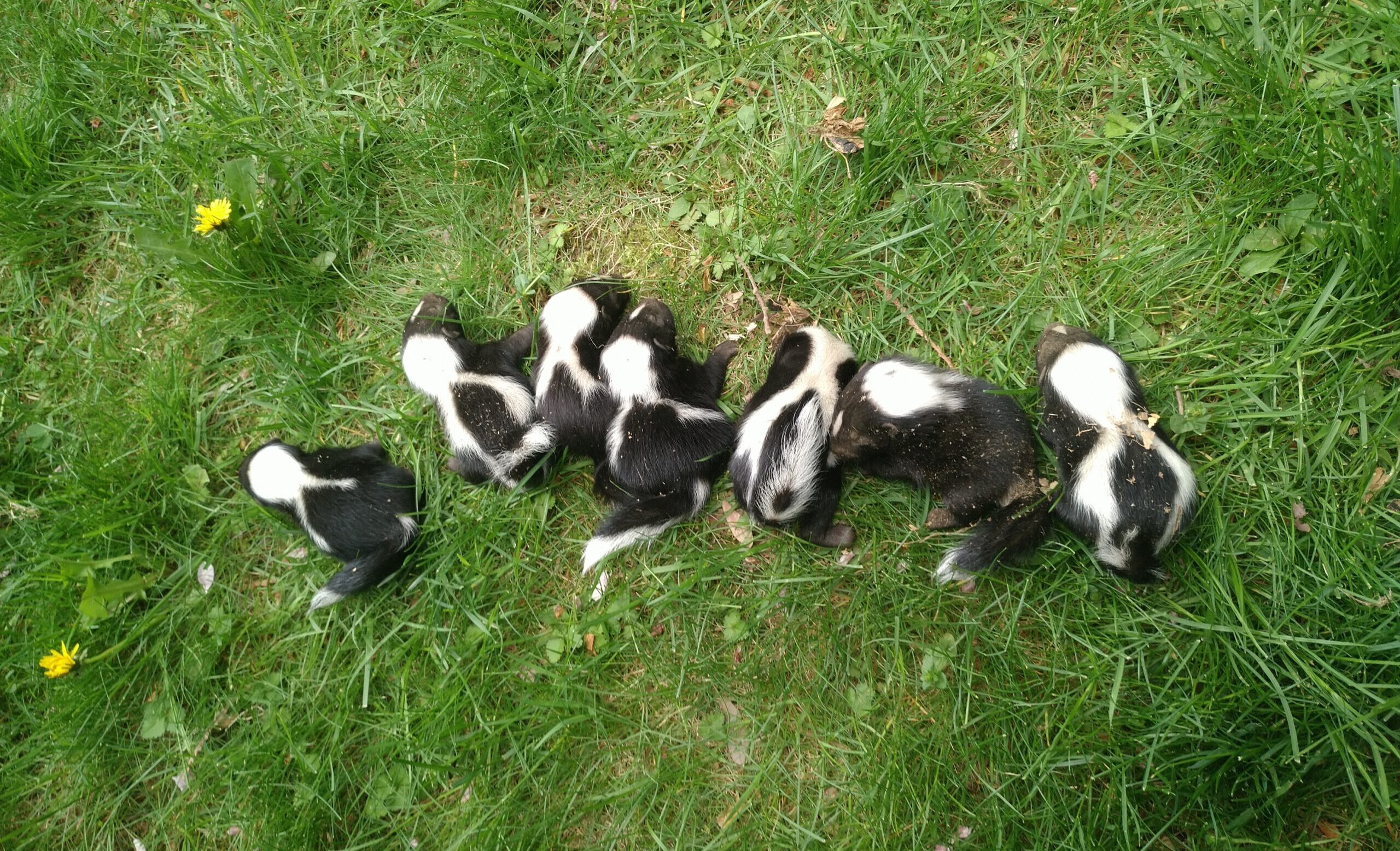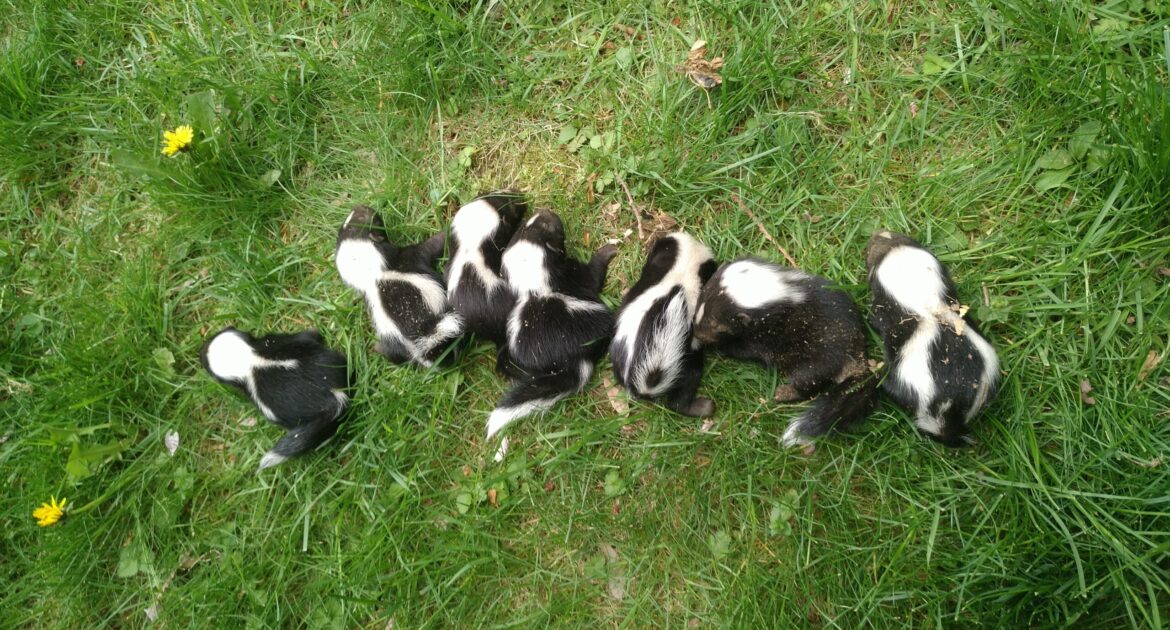Skunks can cause a variety of problems in your yard, from their unpleasant spray to the damage caused by digging. Keeping them out requires proactive steps to make your property less inviting including sealing off entry points and managing food sources.
With proper yard maintenance and a few skunk prevention yard tips, you can discourage skunks and create a safer, cleaner outdoor space for your family. Our experts at Skedaddle Wildlife Control in the Denver Foothills recommend prevention to keep skunks away. Here’s what you need to know.
Why Proper Yard Maintenance Matters
Skunks look for food, shelter, and safety, often finding these essentials in neglected yards. Overgrown vegetation, standing water, clutter, and easy access to structures all provide ideal conditions for them to settle. Consistently maintaining your property helps eliminate these attractions.
Here’s why yard maintenance is so effective for wildlife control:
- Hiding Spots: Overgrown grass, bushes, and piled-up debris offer skunks places to hide and create dens.
- Food Sources: Skunks are drawn to grubs, insects, fallen fruit, and unsecured garbage.
- Shelter: Spaces under decks, sheds, and crawl spaces offer skunks protection from predators and the elements.
By staying on top of yard upkeep, you not only deter skunks but also protect your landscaping and reduce the likelihood of other nuisance wildlife taking up residence.
Effective Yard Maintenance Tips
To keep skunks out of your yard, focus on eliminating what attracts them and blocking their access to potential den sites. Below are actionable, practical tips that can make all the difference.
Seal Off Entry Points
Skunks often dig under sheds, decks, porches, or other outdoor structures to find shelter. Prevent this by reinforcing vulnerable areas:
- Use heavy-duty galvanized steel mesh to cover gaps or spaces around structures.
- Bury the mesh 8–12 inches into the ground to stop skunks from burrowing underneath.
- Inspect your home’s foundation for cracks, vents, or gaps, and seal these areas with rodent-proof material.
- Install sturdy screens over window wells and openings that could serve as entry points.
Taking these steps stops skunks from using your property as their cozy den.
Manage Food Sources
Skunks are opportunistic feeders, so minimizing access to food is a crucial step in prevention:
- Tidy Up: Remove fallen fruit from trees and pick up leftover pet food after meals.
- Secure Garbage: Use trash cans with locking or tight-fitting lids. If possible, store them in a garage or shed.
- Control Lawn Pests: Skunks dig through lawns in search of grubs and insects. Use pest control treatments to reduce soil-dwelling insects. Regular aeration also keeps your turf healthy and harder for skunks to disturb.
By eliminating easy meals, you make your yard far less appealing to these uninvited guests.
Keep Your Yard Tidy
Clutter and overgrowth provide the shelter and hiding spots that skunks look for when choosing a location to settle. Stay on top of yard maintenance by:
- Removing piles of leaves, firewood, old logs, or construction debris.
- Keeping grass mowed and bushes trimmed to eliminate dense cover.
- Raking up fallen leaves, especially during the fall, when skunks become more active in preparing for winter.
- Storing unused garden tools and outdoor furniture securely to reduce hiding opportunities.
Consistency with these practices will prevent skunks from viewing your yard as a safe haven.
Install Physical and Visual Deterrents
Tools like barriers, sprinklers, and lighting can discourage skunks and other wildlife from entering your space. Try these effective solutions:
- Fencing: Install fencing with buried edges, like welded mesh, to stop digging. For best results, ensure the fence is at least 3 feet tall and buried at least 12 inches underground.
- Motion-Activated Sprinklers: Skunks dislike unexpected water sprays, making this a great additional deterrent.
- Outdoor Lighting: Bright, motion-activated lights startle nocturnal skunks, keeping them away from your yard at night.
These methods work best when paired with other yard maintenance practices.
Seasonal Strategies for Skunk Prevention
Skunks’ behaviors change throughout the year, so adjusting your yard maintenance efforts to the season helps prevent problems before they start.
Fall
- Seal potential den sites under structures like decks, sheds, and porches.
- Trim overgrown shrubs and clear out debris to eliminate hiding spots.
- Clean up fallen fruit and nuts from trees.
- Check for drainage issues and address standing water, which attracts insects that skunks feed on.
Early fall preparations reduce the likelihood of skunks settling in before winter.
Winter
- Inspect crawl spaces, sheds, and porches for signs of activity. Skunks may seek shelter here during colder months.
- Keep firewood off the ground and stacked neatly to avoid skunks nesting within the piles.
- Regularly check for tracks in the snow or disturbed soil near structures, which might hint at an unnoticed den.
Proactive monitoring helps identify and address issues before they become larger problems.
Spring
- Remove any debris that accumulated during winter, including leaves and sticks.
- Reinspect your barriers for damage caused by winter weather, replacing or repairing as needed.
- Begin lawn care early to improve your turf’s health and prevent grub infestations that may entice skunks.
Spring is a period of increased wildlife activity. Being prepared ensures your yard remains skunk-free as the season progresses.
Summer
- Keep outdoor dining areas clean and free of food scraps during barbecues and gatherings.
- Close doors and windows when hosting outdoor activities to prevent skunks from wandering into your home or garage.
- Stay consistent with pest control treatments to reduce insects in your lawn.
- Water your lawn during the early morning to deter skunks, which are more active at night.
With these precautions, your yard will stay ready for safe summer fun without unwanted visitors.
Stay One Step Ahead
Preventing skunks from settling in your yard is significantly easier (and cheaper) than dealing with an infestation later. By staying consistent with yard maintenance tasks and incorporating skunk prevention yard tips, you can keep your property peaceful, functional, and skunk-free.
If you’re dealing with persistent skunk problems or not sure where to start, Skedaddle Wildlife Control in the Denver Foothills is here to help. Our team of wildlife control experts specializes in assessing your property for vulnerable areas, sealing entry points, and safeguarding your yard with humane, effective solutions.
Take action today to protect your outdoor space and enjoy peace of mind, knowing your home is better protected from unwanted wildlife! Reach out to us to learn more about our services and how we can support you year-round.




